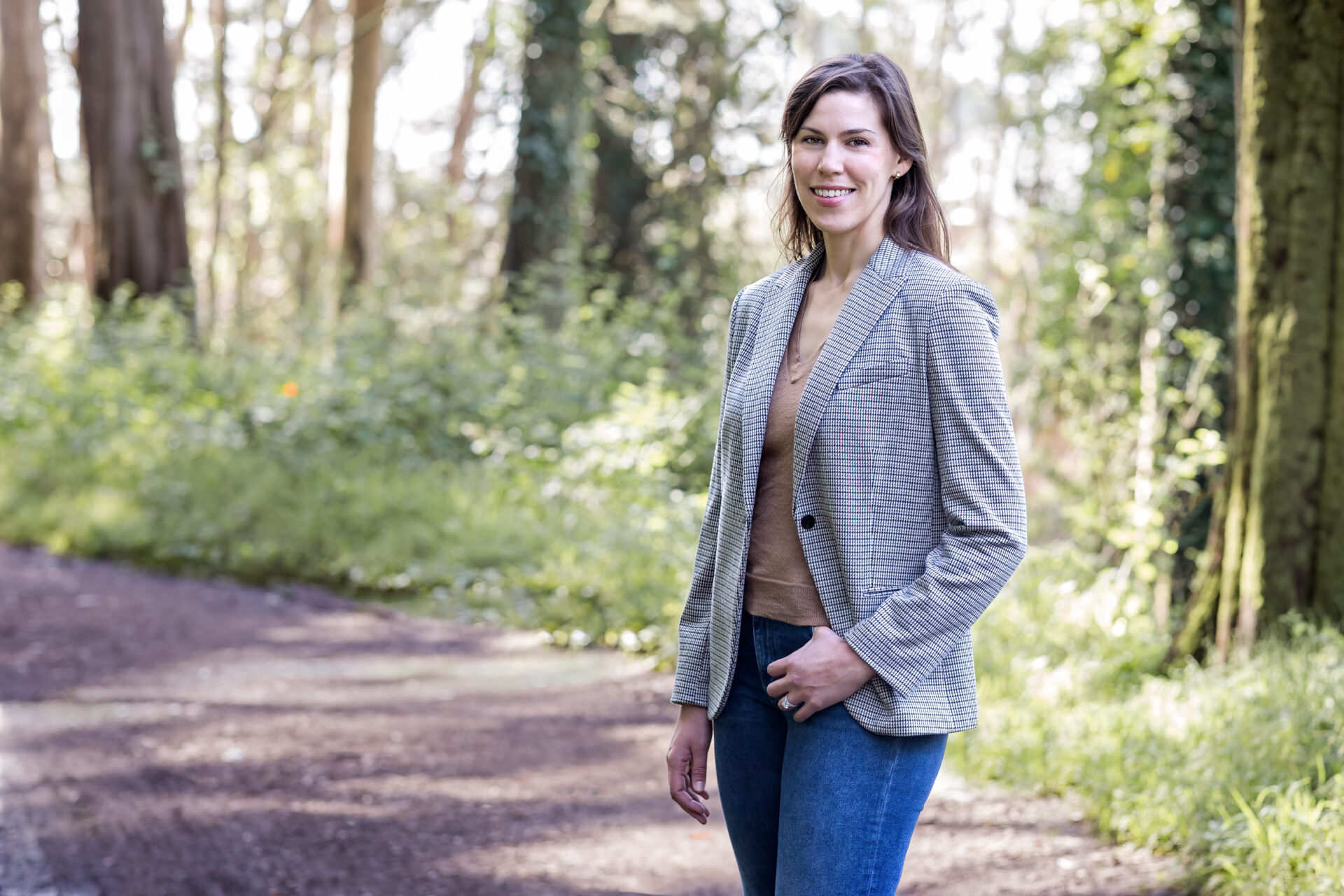
Nicole Systrom has chaired the U.S. Energy Foundation (EF) Board of Directors since taking the reins from Rose McKinney-James. As we look to opportunities in 2023, we wanted to sit down with Nicole to talk about her leadership, priorities, what excites her about EF’s work, the role of philanthropy in the climate and clean energy space—and what gives her hope that her children will see a healthy, prosperous, and equitable clean energy future.
You bring a wealth of experience in the clean energy space to your position as board chair—catalyzing growth in technology startups that mitigate climate change; advising philanthropists, investors, and entrepreneurs on how to accelerate high-impact climate and clean technology solutions; and now serving as Chief Impact Officer of Galvanize Climate Solutions, the investment platform created to provide the capital, expertise, and partnerships necessary to produce and scale vital and urgent climate solutions. How does your unique set of experiences inform your leadership on the board?
What distinguishes my background is that it’s multi-disciplinary—and that’s the perspective I want to bring to what we do at EF. I have worked in start-ups, philanthropy, at non-profits… Early in my career, I wrote grant proposals to EF. I moved to the for-profit side of things, went to business school, ran a consulting firm focused on serving a broad mix of folks—investors, philanthropists, charitable organizations, Fortune 500 companies—all of which reflects my belief that climate progress requires participation from all kinds of groups, with all types of skills and experience. Unfortunately, policy alone won’t do it, or just inventing a new technology won’t do it. We see this breadth reflected in EF’s programs—the power sector, transportation sector, energy optimization, climate policy, and also in the variety of EF’s tactics, ranging from communications, policy work, to community organizing and campaigns. And you can cut it further by venue—national, subnational, international, different geographies. So it’s abundantly clear that climate is an interdisciplinary problem, and in order for climate philanthropy in general to be effective, we have to acknowledge that. EF takes a broad view about all the tools and actors it takes to get policies put in place that will be beneficial to the climate.
What are some of the priorities you will carry forward from previous chairs, and what are some new ones you’re thinking about?
The obvious one to carry forward is building a more inclusive, equitable movement, which means increasing both EF’s skill and fluency with equity as an organization and in our support to equity-focused groups. Rose was such a great champion of this, building from the seeds planted at the end of Governor Bill Ritter’s term as board chair before her. A more inclusive, equitable movement is the right direction from a moral standpoint, but also from a strategic one. For example, significant clean energy commitments recently made in Illinois (2022) and Minnesota (early 2023) depended on broad and inclusive educational campaigns; EF was proud to support many of the equity groups at the center of these coalitions.* It’s important that we’re thinking about how diversity, equity, and inclusion can reverberate through both our internal operations and also who and how we fund. This is a priority I will be carrying forward.
Also, Rose’s tenure spanned COVID-19, which sparked a huge reorganization at EF and where our people live and how we empower them—I think for the good. We’re still in the midst of this transition, so the board and I are watching that closely in terms of the health of our organization.
Are there areas of progress in the work of Energy Foundation and its grantees that especially excite you?
I am bowled over by the way we’ve been able to partner with funders to bring more climate philanthropy into the space—some of which comes directly to us, and some that goes directly to the field, but which we help facilitate. We’ve demonstrated we can be effective as guides to climate philanthropists as they come into this space, whether or not they fund us directly, and that’s an important service we provide the field. We’ve helped direct more dollars to deserving grantees.
Operationally, I’m excited by how the mix of our grantees has grown over my time on the board. We’re moving into more local and regional groups, equity groups, beefing up our communications support. Our staff has worked to serve grantees better, reducing the reporting burden, providing more long-term funding. And, during COVID, our programs were focused on getting rapid-response funding into the hands of grantees and trusting them to do what they needed to keep their organizations running. It’s a trend in philanthropy overall to push to trust-based philanthropy, and you can see that in the way we’re doing our work.
Federally, we’ve now got the investments coming through from the Inflation Reduction Act (IRA), which has been a long time in coming. Philanthropists could think, “This is great! We’re good!” But that is not at all the case. We just got to the starting line, and now we need to ensure that the IRA, the Infrastructure Investment and Jobs Act (IIJA), and other federal funding actually goes to impactful state projects and communities that deserve it. Working in the states is our home base. I’m proud of the way EF staff members are taking that challenge on and trying to help focus climate philanthropy on the idea that the IRA is not the finish line; it just creates so much more opportunity that we need to take advantage of and follow through on.

What do you appreciate about the current EF board?
I consider my time on the EF board among the most rewarding professional experiences I’ve had, and that’s partly because of what I’ve learned from past and current board members. What I appreciate about the current board is that, in addition to being experts in their various fields, they have a strong spirit of service and commitment to our mission and the energy transition. It’s also a collegial group of people to be with, which makes working on EF priorities not just purposeful, but pleasurable.
When I was on the Governance and Nominations Committee prior to becoming board chair, we worked hard to increase the diversity of our board to better reflect the breadth of people and communities we’re trying to serve, and to bring new experiences and perspective to the decisions we make. This mirrors what’s happening in the broader climate movement, as we work to build the coalitions necessary to ensure climate and clean energy progress. We’re better for it.
What gives you hope that your children will see a healthy, prosperous, and equitable clean energy future?
Over the course of my lifetime, I have seen a tremendous shift in how we as a global society think about and approach climate change, and it’s more pronounced in the past few years. There’s the sheer number of people who want to work on this issue—the energy of Gen Z as they grow into engaged young adults, becoming policymakers, leading organizations, using their voices in so many ways, with climate work being one of them. There’s the way the clean technologies we rely on today have come down in cost far faster than anyone predicted they would. And there’s also the simple fact that we were on a very dangerous path regarding climate, and have bent the curve on warming. We’re still aiming too high there, but the fact we’ve shaved off a couple of degrees of warming from the trajectory of where we were headed is remarkable. I also see the private sector, corporate sector, engaging with this in a way that was not true 10 years ago. Climate is now being seen as a real business issue. Major CEOs around the world are connecting their license to operate with climate change action. There’s a lot of momentum—and we have to go a lot faster, on all climate fronts.
How can philanthropy have the biggest impact today?
From a U.S. perspective, we now have federal investments from the IRA, IIJA, and the CHIPS and Science Act—the trio of policies that collectively represent on the order of half a trillion dollars going into the clean energy transition, a huge chunk of it focused on justice and equity. But it is by no means assured that the money will be distributed in the most effective manner. Philanthropy has a critical role to play to support the capacity of the grantee community to provide technical support as these three policies are implemented and regulations are written. If we do it right, it could potentially have a much bigger impact than what everyone’s projecting today. But we need to think as philanthropists about deployment and how we turn these policies into real physical changes in infrastructure. We also need to connect these changes to people’s everyday lives. We need the public to understand that the clean energy transition is good for them. Without widespread public support, these policies could be vulnerable to the whims of whatever politician is elected next. These policies are designed to be durable, but philanthropy needs to be there to make sure that is actually the case.
More broadly—if you’re a climate philanthropist but energy or transportation are not your interests, the good news is there’s still plenty of important work to fund—restoring nature, increasing climate justice, or driving climate progress internationally are just a few ideas. Again, stabilizing the climate requires a multi-disciplinary approach. There’s a lot of opportunity, and I hope that instead of that being overwhelming, it’s energizing to philanthropists who either are currently giving to climate and want to increase their giving, or those who are just coming into the space. We have experienced grantees in the field who know what to do if they have resources, so it’s a very exciting moment.
*Note that all EF-funded activities are 501(c)(3)-compliant.
